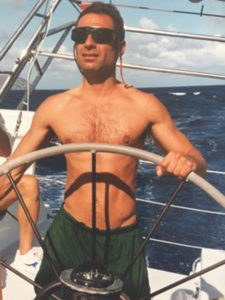TRURO — On World AIDS Day, Dec. 1, 1990, Stephen Kovacev’s partner, Kevin McLean, a ballet dancer, died of AIDS.

“I met him in ’82,” Kovacev told the Independent. “He was from New York City, the place — together with San Francisco — we called ground zero, the epicenter of the AIDS epidemic. I don’t know whether I got HIV from him or not. That doesn’t matter. You would never want to miss a great love in your life, regardless. A lot of summer happened in our lives.”
Though he has called the Outer Cape his home since the 1970s, Kovacev became a year-round Truro resident in 1990. He was diagnosed with full-blown AIDS in 1994.
“My T cells were once zero,” he said. “It’s pretty miraculous that I’m still here. But life is miraculous.”
In 1997, he became the first AIDS survivor to run the Boston Marathon. He has regularly run marathons in the Gay Games since then, and he is also a cancer survivor, following successful treatment of throat cancer in 2017.
Faced with the current Covid-19 crisis, Kovacev feels his greatest challenge is dealing with political and emotional realities. He self-isolated in early March and is following all the guidelines and safeguards. As an AIDS and cancer survivor, he has learned to trust his doctors and his body’s ability to persevere.
Trusting how a government, such as the current one, handles a major crisis is another matter, Kovacev said. He remembers the sense of utter abandonment he and many others dealing with the AIDS epidemic felt during the Reagan administration, a memory stirred by such current realities as the shortage of tests, ventilators, and personal protective equipment.
“We were completely on our own back then,” Kovacev said. “There were no press conferences — just the nightly news reports of emaciated gay men dying.”
Kovacev is documenting the early days of AIDS in Provincetown in a memoir he’s calling Soul of the Phoenix. It’s a “triumph-over-tragedy story,” Kovacev said. He is focusing on the ways people supported one another to survive an extraordinary crisis.
With the coronavirus upon us, his memories are coming alive again with new force.
“I am reminded of the fear people felt then,” Kovacev said. “We are now, once again, living in a time of an unknown illness, with a fear of touching, a fear of being close. I am reminded of the overwhelming loneliness we felt. And how it affected our mental health.”
Then, as now, people suddenly and drastically changed how they acted in daily life.
“If someone who was suspected of having the virus came to dinner, the host would throw out everything they touched — their plate, their glass, their fork,” Kovacev said. In the early years, “no one knew how the AIDS virus was being transmitted.”
Doctors and nurses were at the forefront. “People were afraid of touching patients, but the doctors and nurses were there to help, as they are now,” Kovacev said. “My doctors and health care providers are my friends. They were then, and are now, our heroes.”
